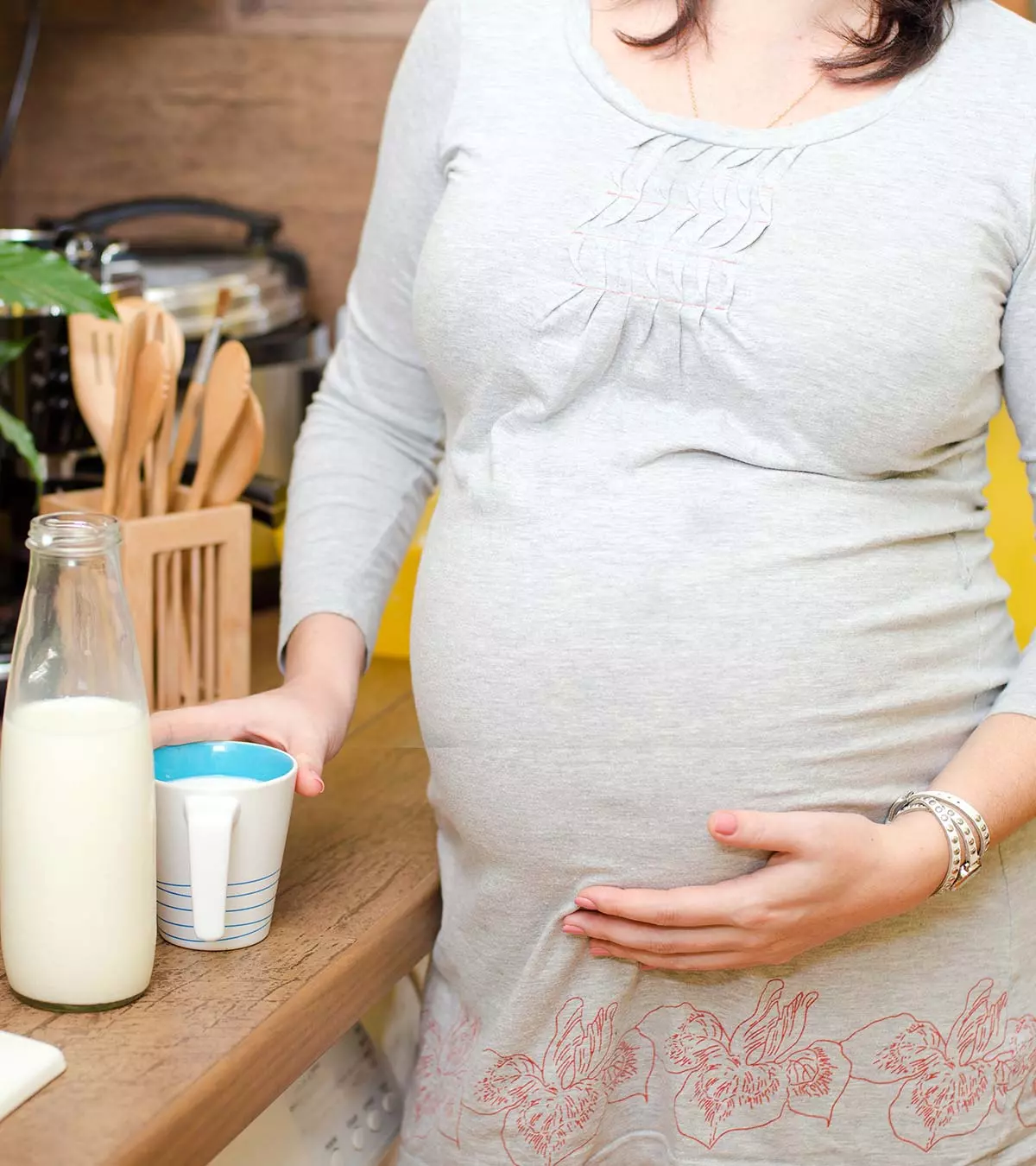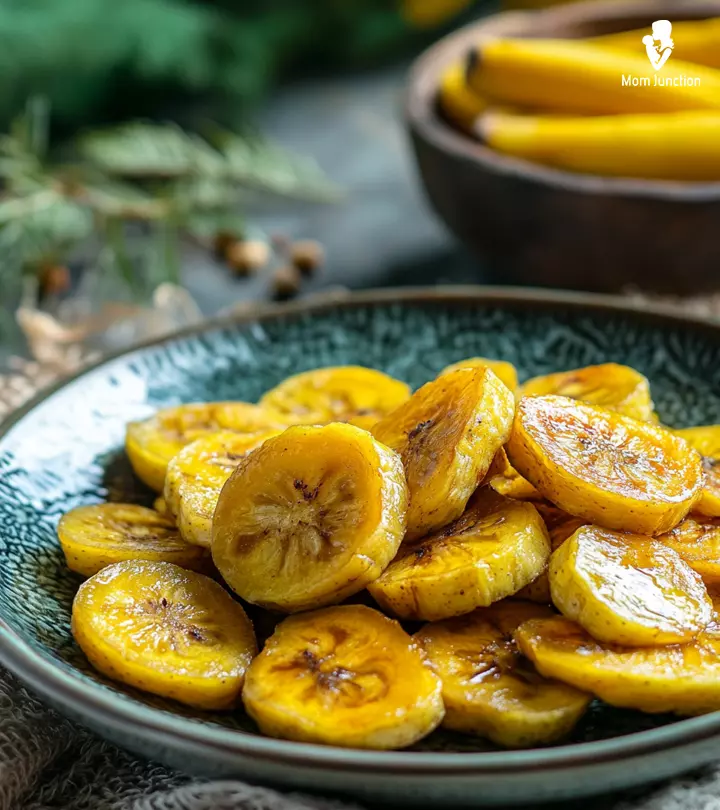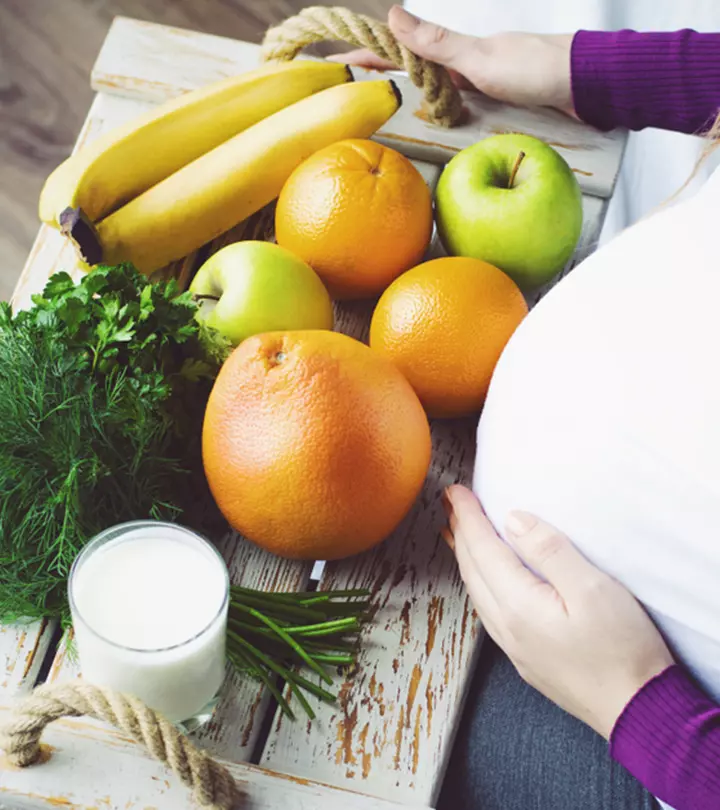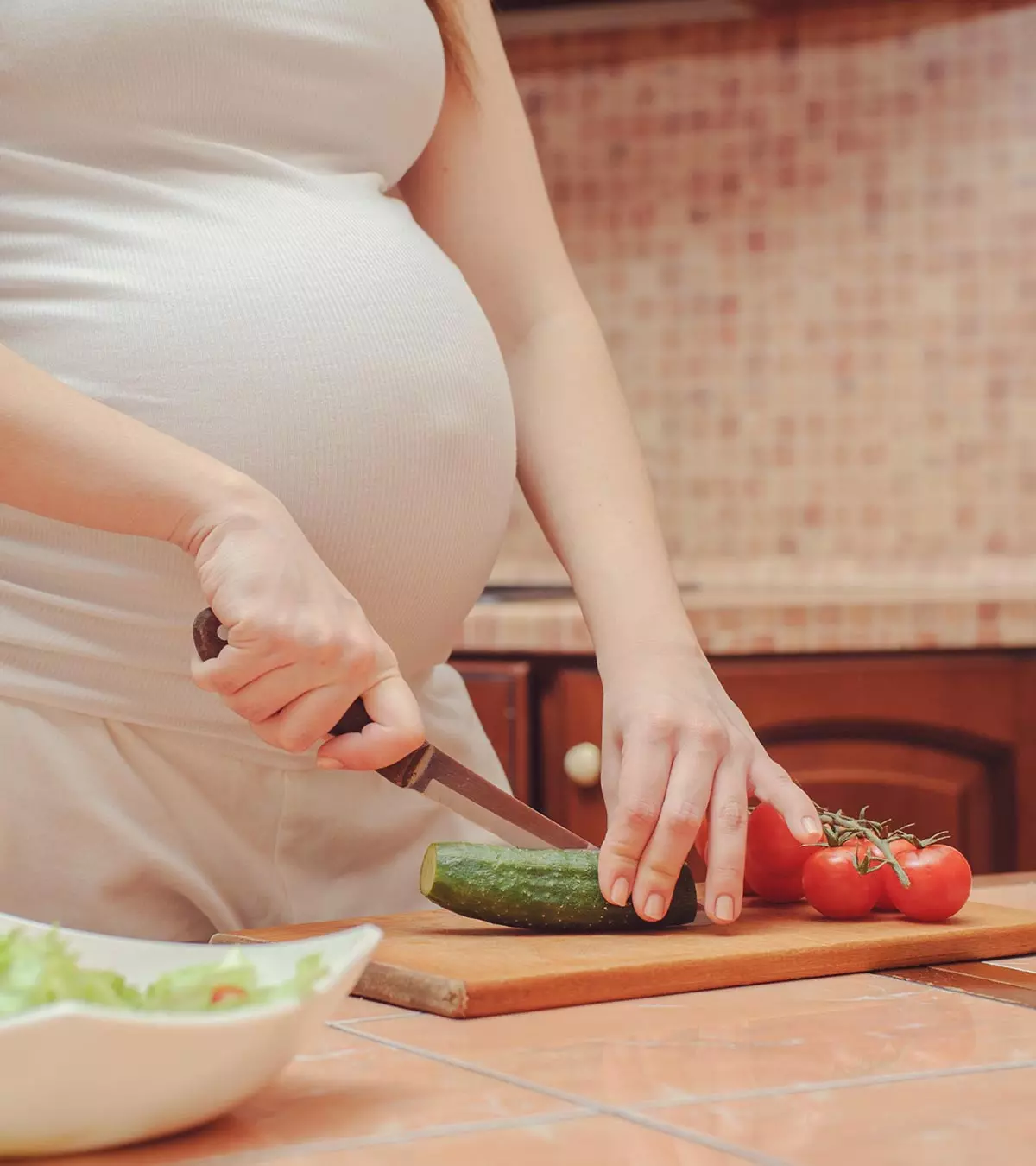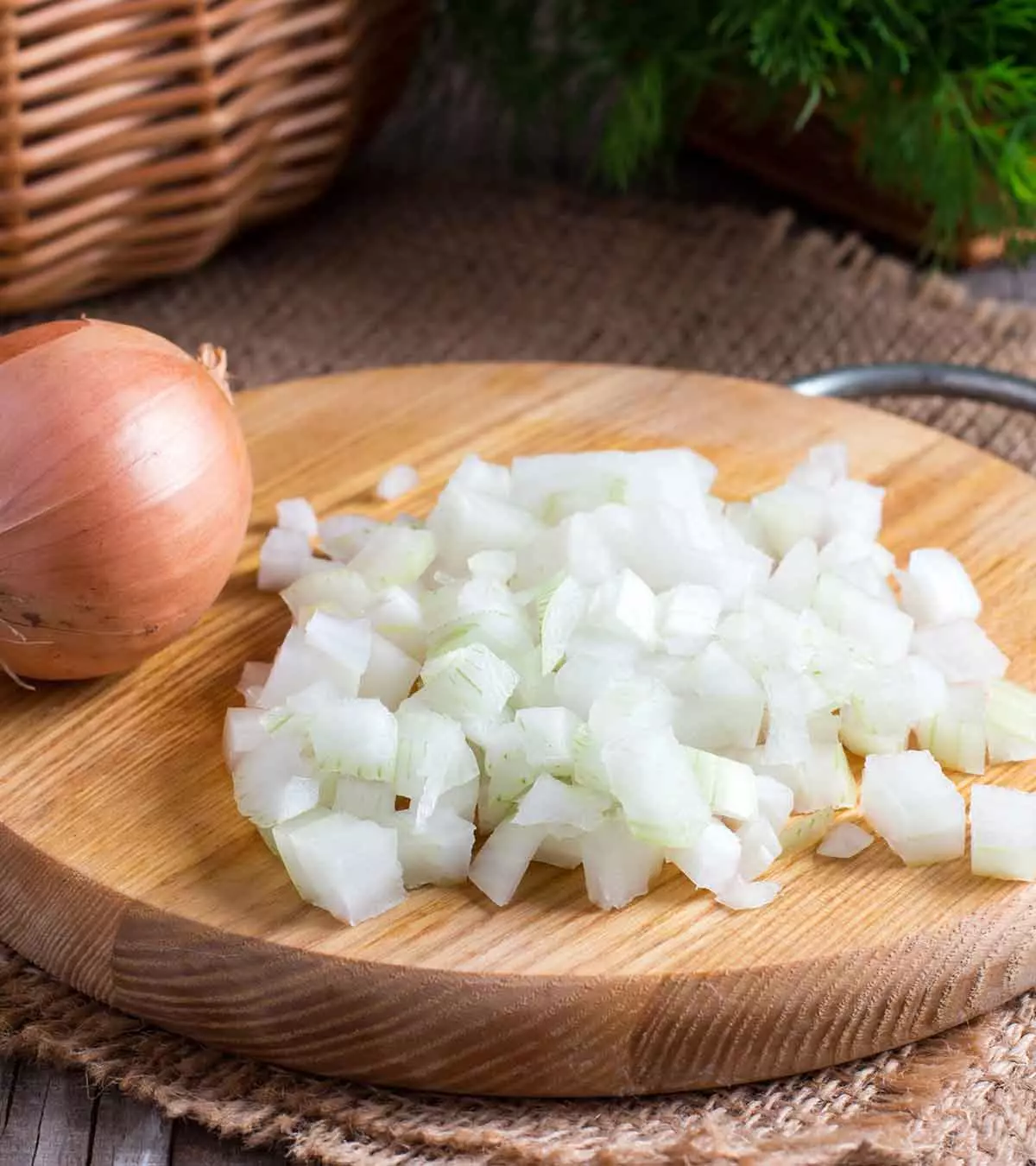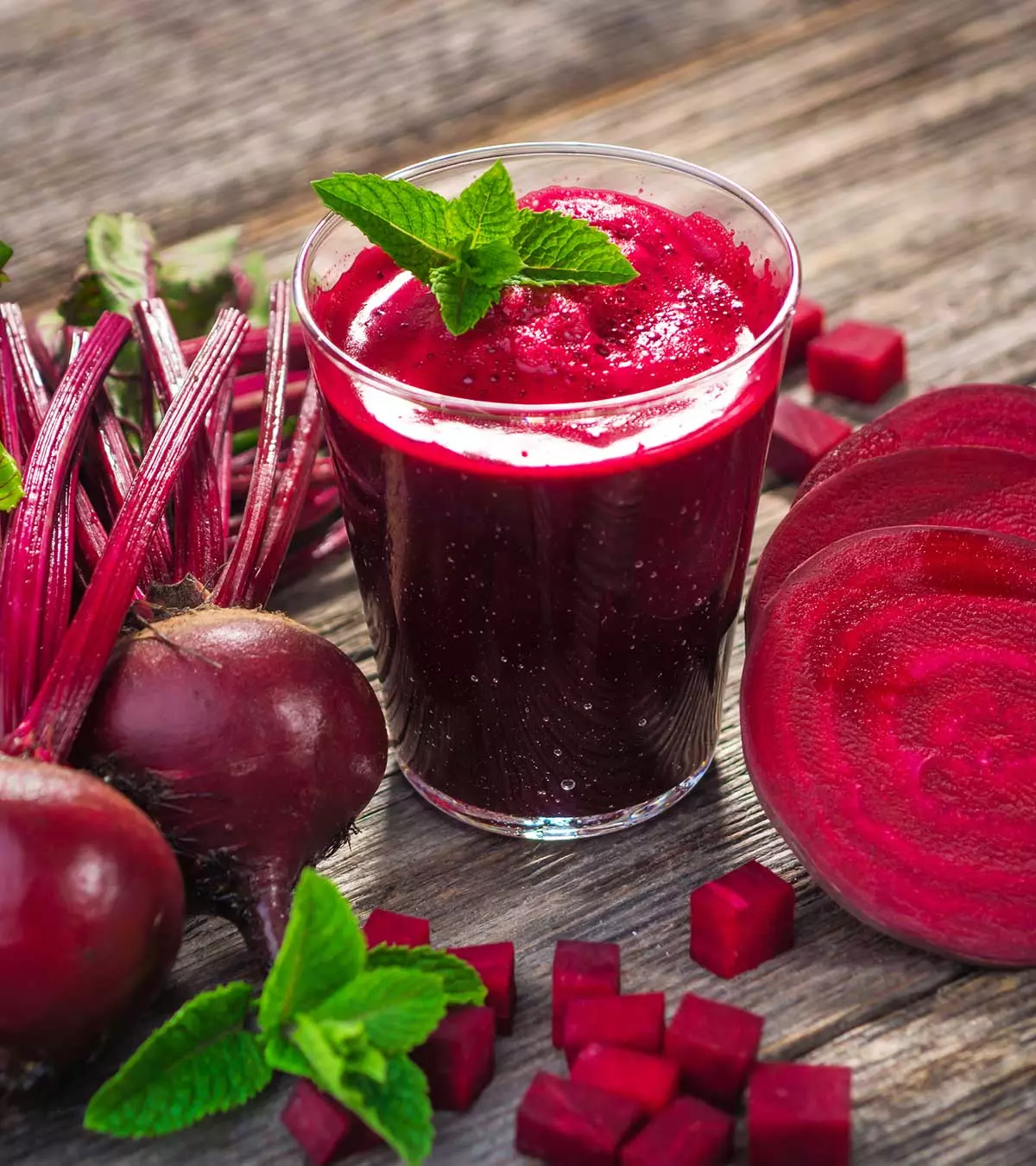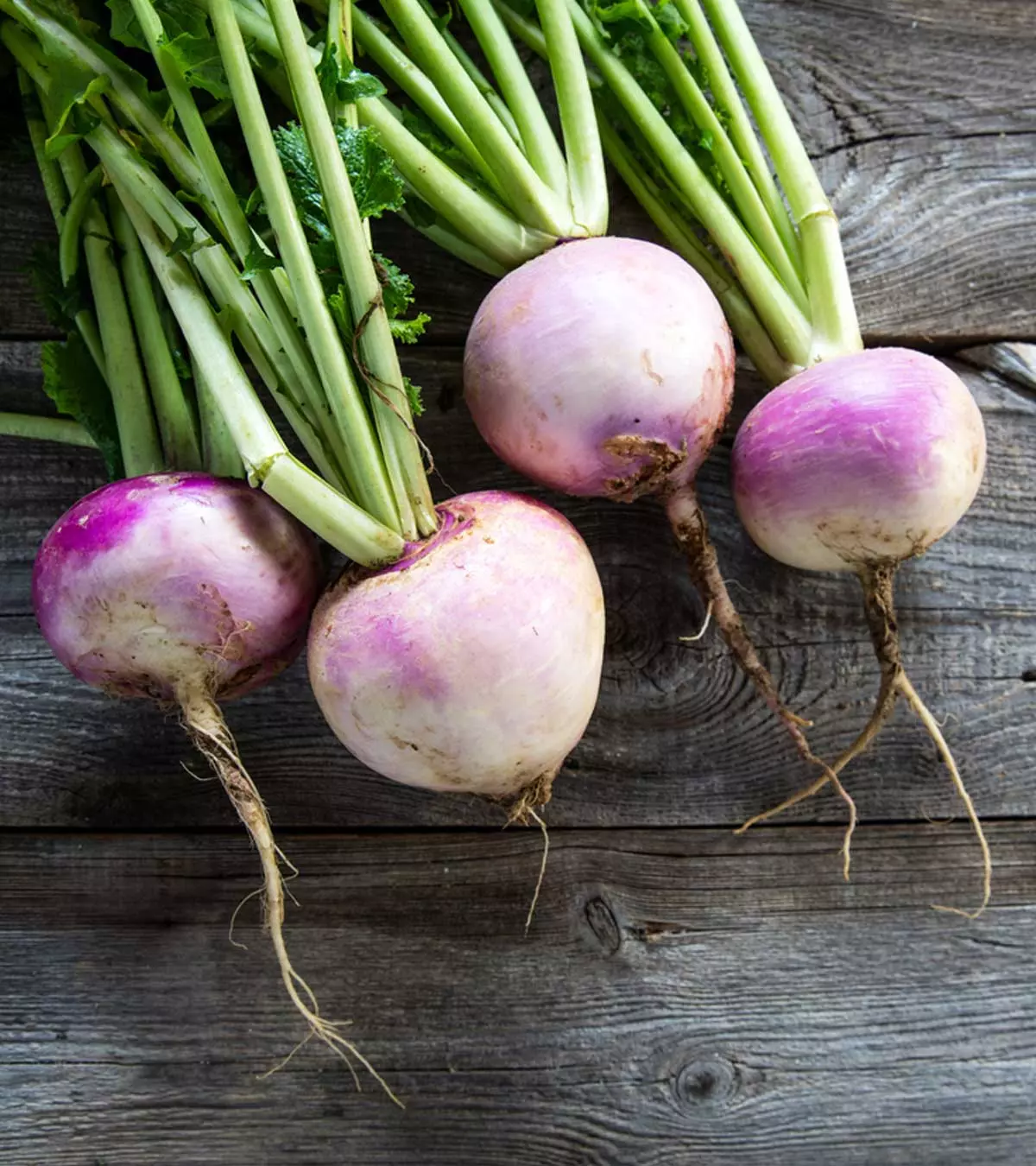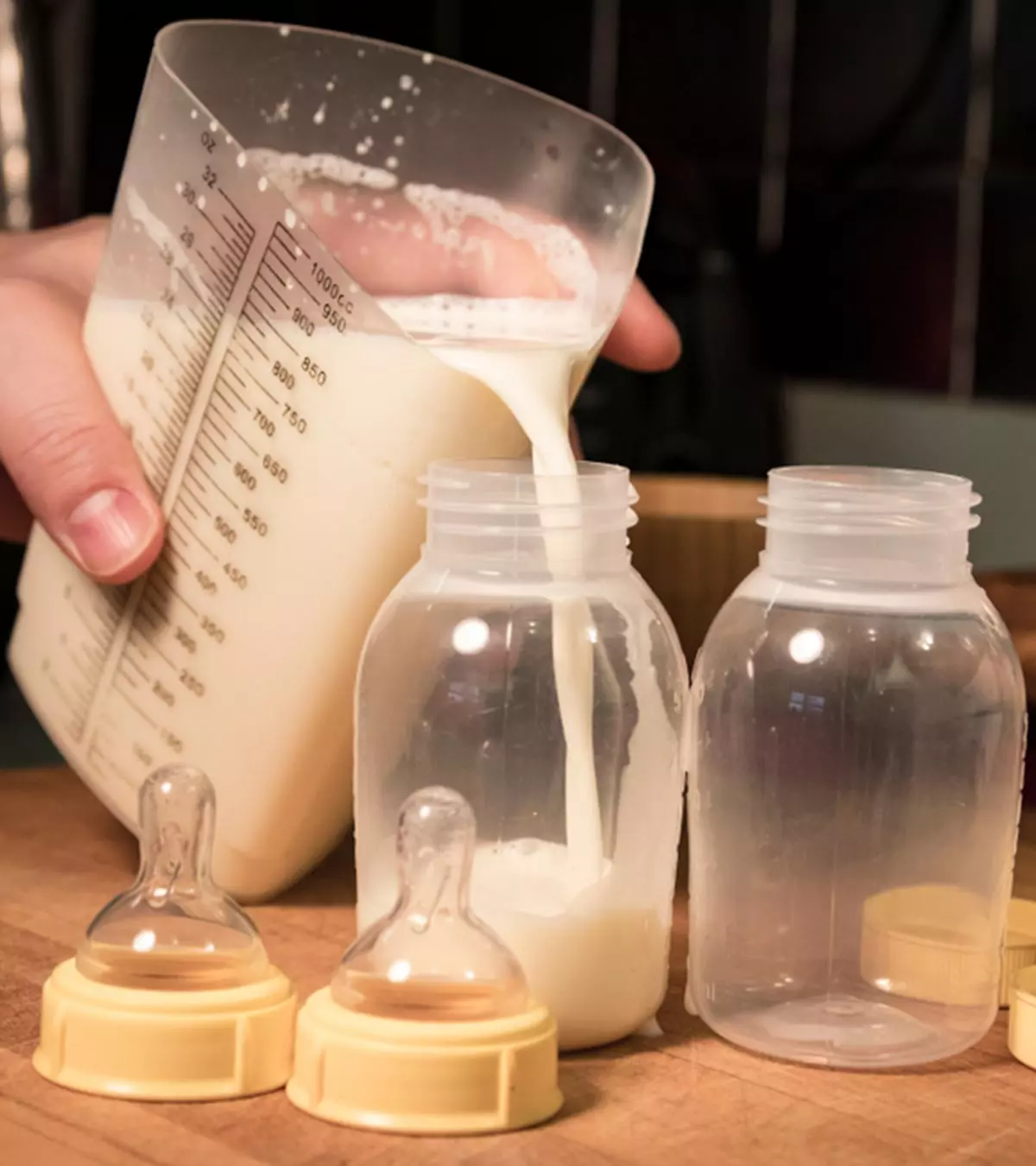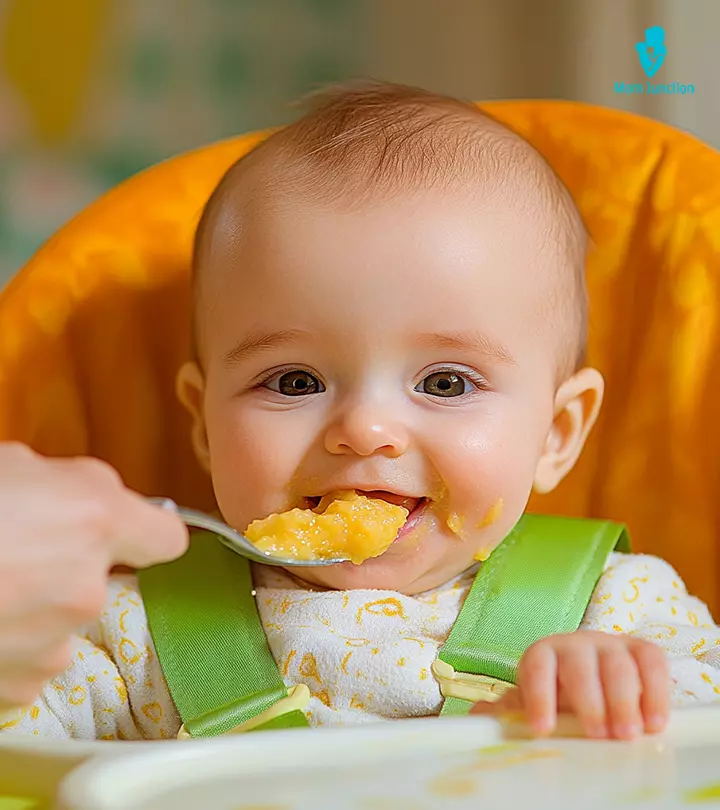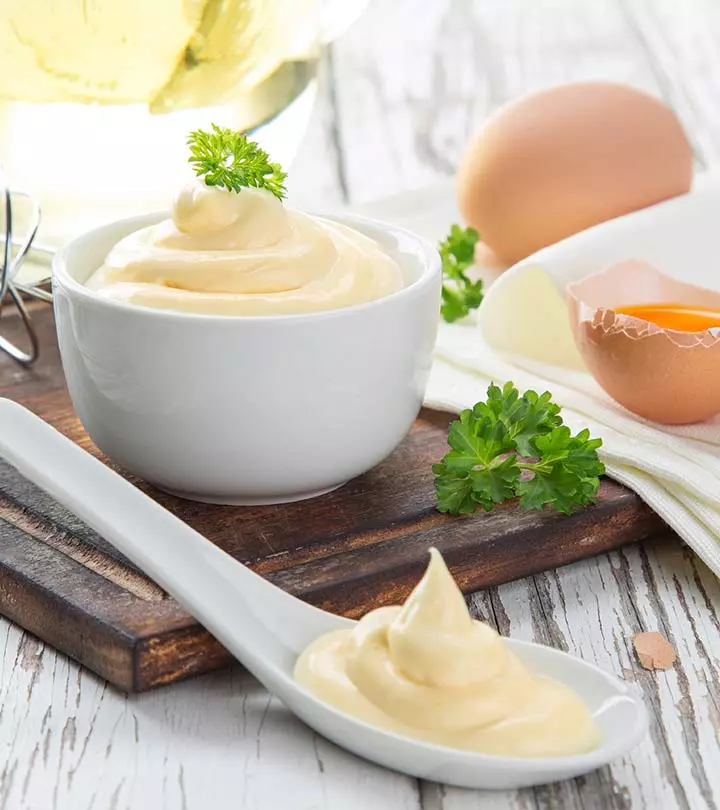
Image: ShutterStock
Mayonnaise or mayo is a creamy sauce often used in sandwiches or burgers as a spread and as a salad dressing. It is prepared by mixing egg yolks with an acid, such as vinegar or lemon juice. You might relish it before pregnancy, but eating mayonnaise when pregnant warrants caution. It is essential you practice safe eating habits during pregnancy to maintain your health and support your baby’s development.

The eggs used in mayo preparation are usually uncooked or raw. Besides, the eggs may or may not be pasteurized. Eating undercooked, raw, or unpasteurized eggs can expose you to harmful pathogens and adversely affect your health and that of your baby.
Keep reading to know about the different types of mayonnaise, their safety for pregnant women, and precautions to take when consuming mayo.
Key Pointers
- Pasteurized egg, canola, or olive oil-based mayonnaise is safe for pregnant women due to fewer bacteria than raw egg-based mayonnaise.
- Different types of mayonnaise have varying calorie, cholesterol, sodium, and ingredient content that can affect the mother and fetus.
- Limited consumption of mayonnaise can help with labor, fetal development, weight, and lipids.
- Check ingredients, preservatives, hygiene, and medical advice before consuming store-bought mayonnaise.
- Alternatives to mayonnaise include yogurt, nut spread, fat-free sour cream, mustard, and tofu mayonnaise.
Can You Eat Mayonnaise When Pregnant?
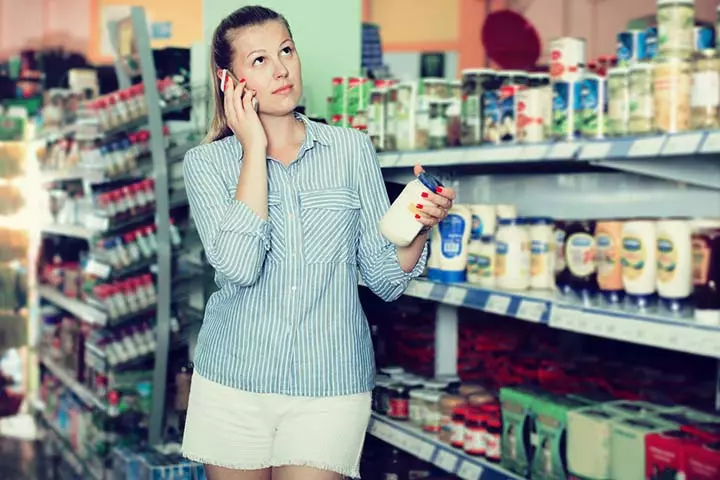
Mayonnaise is made both with egg and without it. Eggless mayonnaise contains olive oil or canola oil instead of egg as the base ingredient (1). Both types can be used during pregnancy.
However, eating mayonnaise prepared with egg is considered safe if it is made of pasteurized (heat-treated) eggs. It is made of egg yolk, mixed with vegetable oil, and lemon juice or vinegar. Protein and lecithin in the egg yolk act as emulsifiersiSubstances or food additives that help in mixing immiscible liquids such as oil and water in mayonnaise (2).
Commercial mayonnaise available on the non-refrigerated shelves in supermarkets is made of pasteurized eggs and is safe for consumption. It is recommended to eat pasteurized eggs during pregnancy.
However, avoid home-made mayonnaise as it is made of raw eggs, which run the risk of containing salmonellaiA bacterial genus that may cause foodborne illnesses during pregnancy (3).
Mayonnaise sold in restaurants or food markets may be avoided unless you are sure that they use pasteurized eggs.
Types Of Mayonnaise
You can select a mayonnaise that suits your requirements of fat and calories, as the spread is made with several variations. Here are a few (4):
Real mayonnaise meets the Codex Alimentarius food standards with a fat content of 78.5% and an egg of 6%.
Full-fat mayonnaise contains 65-75% fat.
Light mayonnaise, as the name suggests, has a low-fat content of 20-30% and around 3% egg. They include thickening agents such as maize starch and xanthan gum.
Extra mayonnaise contains less than 10% fat and 4% egg.
Nutritional Values In Mayonnaise
Even if you are opting for commercially made mayonnaise, know the nutritional values before consumption as it could be high in calorific values.
- One tablespoon (14g) of mayonnaise contains around 94 calories, or 100gm contains 700 calories of fat. The calorific value however differs with respect to the type of mayonnaise.
- One tablespoon also has 5.8mg of cholesterol. The 2010 Dietary Guidelines for Americans recommends consuming not more than 300mg a day. (5)
- There can be 80mg to 125mg of sodium in one tablespoon of mayonnaise, while the recommended daily intake of sodium should be less than 2,300mg.
- Commercial mayonnaise contains 80% vegetable oil, 8 % water, 6% egg, 4% vinegar, 1% salt, and 1% sugar.
- Low-fat mayonnaise has around 50% vegetable oil, 35% water, 4% egg, 3% vinegar, 1.5% sugar, and 0.7% salt.
Benefits Of Mayonnaise
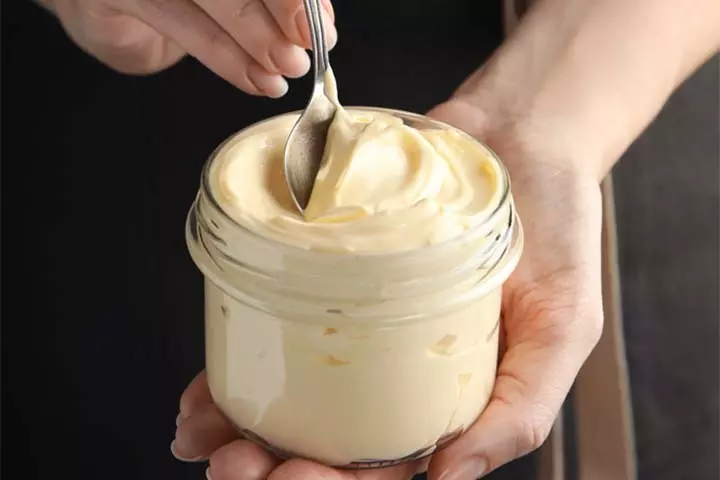
Mayonnaise, when eaten in limited quantities, can be good for health. Here is how it can be beneficial for you.
- Vitamin K: One tablespoon of regular mayonnaise has around 22.5 micrograms (mcg) of vitamin K, which is more than 25% of the daily requirement of 90mcg (AI) (6).
Vitamin K is important during labor as it helps in clotting and prevents excess bleeding. In babies, it is required for the development and normal blood clotting (7). - Fat content: One tablespoon of regular mayonnaise has 2.32g of total MUFA (monounsaturated fatty acidsiFatty acids containing a single unsaturated double carbon bond, found in plant and animal food sources ) and 6.17g of total PUFA (polyunsaturated fatty acidsiFatty acids containing more than one unsaturated carbon bond ). Maintaining a healthy MUFA:PUFA ratio is important during pregnancy as it not only affects mother’s health but also the health and development of the growing fetus (8)
Total fat during pregnancy is required for the body in small amounts only. Any excess of saturated fat puts you at risk of excess weight gain and abnormal lipid profileiA blood test that determines the levels of specific fat molecules in the blood . Mayonnaise has saturated fat that is not good for health when consumed in high amounts.
Remember that mayonnaise need not be taken as a health food during pregnancy as you can get these vitamins and fat from other healthier foods.
How Can Mayonnaise Be Harmful During Pregnancy?
Mayonnaise is not an outright harmful food, however, its consumption during pregnancy must be done cautiously.
Sarah Bullard, MS, a registered dietitian from Nacogdoches, Texas, says, “Fresh mayonnaise is made with raw eggs. Raw or partially cooked eggs could contain a bacteria called salmonella. When pregnant, you are at an increased risk for infections. Salmonella poisoning could cause intrauterine infections severe enough to cause a miscarriage. Commercial mayonnaise uses pasteurized eggs which eliminates the risk of salmonella poisoning.”
Here are a few reasons why it should be avoided or limited to small amounts during pregnancy.
- Bacteria: If you consume mayonnaise that is infected with salmonella, it could lead to extreme dehydration, bacteria in the bloodstream, meningitisiInflammation of the fluid and protective layers of the central nervous system , and reactive arthritis.iInflammatory arthritis causing redness and intense pain in various body parts Also, your baby can get infected with salmonellosis.
It is essential to ensure egg safety during pregnancy. Mayonnaise made with raw egg can also have the risk of containing listeria bacteria, which can lead to listeriosis, a very rare disease during pregnancy. (9)
 Quick fact
Quick fact- High calories: Adding a teaspoon of mayonnaise once in a while may not be such a problem in this case. However, the use of mayonnaise in high amounts and regularly could lead to overconsumption when combined with other high calorie-food that you take every day. This could lead to excess weight gain.

- Fat content: During pregnancy, your body needs more fat than usual due to physiological reasoning such as gaining fat tissue around the pelvic area to support the labor process. Therefore, 30-35% of your total calories must come from fat and preferably MUFA (10). However, overconsumption must be avoided. A study in 2016 found that excess fat consumption by the mother can damage the baby’s immune system (11). Another study by The Cleveland Clinic and West Virginia University, says that children born to mothers with high fat levels will have obesity problems later in their life.
- Sugar and sodium levels: Mayonnaise is high both in sugar and sodium, the two ingredients that need to be taken in limited quantities during pregnancy. Research studies have shown that in the long run, high sugar foods can lead to diabetes and sodium could potentially increase your blood pressure (12).
- Artificial preservatives: Mayonnaise available in the market is preserved with chemicals and additives. They are mostly safe but some women might have side-effects such as nausea and weakness. They can also prove to be allergic to some women, putting their pregnancy at risk.
Safety Measures
How can you satisfy your urge to eat mayonnaise while not getting affected with its side-effects during pregnancy? Follow these safety measures and enjoy your spread:
- Check the ingredients: If you are eating mayonnaise at a restaurant or an eatery, always find out the ingredients that have gone into it. Do not shy away from asking if the eggs used were pasteurized. If they were raw, make sure that they are British Lion stamped, as they are safe for consumption.
- Check the label: Do check the label of mayonnaise you buy in the supermarket to know its fat content, information on preservatives, and more such details. Check whether or not the mayonnaise contains raw eggs, and if yes, do not eat them.

- Use a clean knife: When taking mayonnaise out of the jar, to apply on your food, use a clean knife to ensure that there are no bacteria or germs on it.
Alternatives To Mayonnaise
Any variations of mayonnaise that do not contain egg are not considered to be mayonnaise in the US, as the Food and Drug Administration does not allow for their labeling in that name (13).
Egg-free alternatives to mayonnaise are a great choice for pregnant women who are allergic to egg or are vegans. Brands such as Nayonaise and Vegenaise in the US, and Plamil Egg Free in the UK are famous substitutes for mayonnaise.
If you love to have your sandwiches or bread with a spread but want to avoid mayo during pregnancy, opt healthier alternatives such as:
- Tofu mayonnaise
- Almond and cashew paste spread
- Plain yogurt
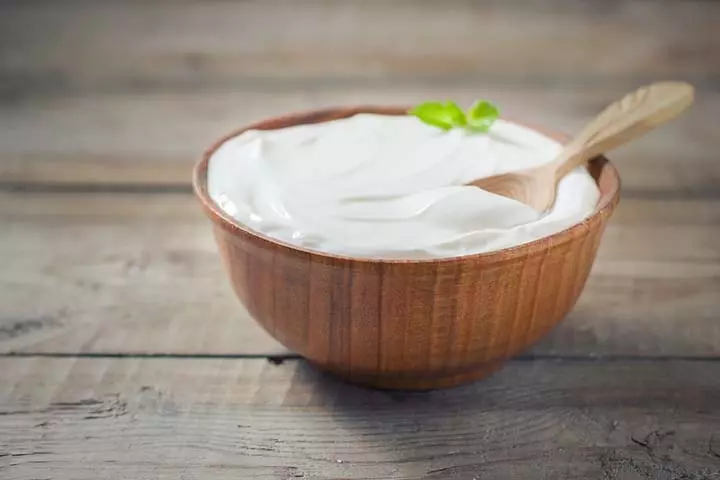
- Mustard
- Fat-free sour cream
- Avocado
Frequently Asked Questions
1. Why is commercial mayonnaise safe?
Commercial mayonnaise are safe and bacteria-free because they are prepared from pasteurized eggs and undergo a series of processes that kill food-borne illnesses.
The Association for Dressings and Sauces in the US has observed that commercial mayonnaise does not cause foodborne illness as it is made of pasteurized eggs by following all food safety standards.
The presence of salt, lemon juice, and other acids do not allow the growth of bacteria.
2. Are Hollandaise and Bearnaise sauces safe to eat during pregnancy?
Both Hollandaise and Bearnaise sauces are made of egg and clarified butter. The two ingredients are mixed on low heat. This is different from mayonnaise because mayonnaise involves blending of eggs with vegetable oil, without any heating.
Just like mayonnaise, they may be eaten if the eggs are pasteurized and are not home-made. Heating can kill infection-causing bacteria to an extent, but pregnancy is not the time to take such health risks.
3. Can I consume expired mayonnaise when I am pregnant?
Generally, expired mayonnaise is not harmful. It can be eaten for three to four months after its ‘best-before’ date if it is a branded product and stored at the right temperature after opening it.
However, it is advisable not to eat it during pregnancy as any growing bacteria can affect your health.
4. Why is homemade mayonnaise not as stable as commercial mayonnaise?
Unlike homemade mayonnaise, commercial mayonnaise may contain chemical stabilizers, preservatives, and excessive salt and vinegar to increase its shelf life.
5. What chemicals are in mayonnaise?
Preservatives such as sodium benzoate and calcium disodium EDTA are used as preservatives in mayonnaise. In addition, Xanthan gum and modified starches (amylose and amylopectin) may be added as stabilizers (14).
You don’t have to resist the temptation of savoring the flavor of rich, creamy mayonnaise when pregnant because eating in moderation won’t hurt you or your baby, but it’s still best to be cautious. While commercially sold mayonnaise, with or without eggs, is deemed completely safe, homemade mayonnaise and those found in food corners should be avoided since they may include raw, undercooked, or unpasteurized eggs. So go ahead and use this delectable creamy spread in your sandwiches, salads, pasta, and other favorite foods, but make sure to use high-quality commercially available mayonnaise.
Infographic: Alternatives To Mayonnaise
If you cannot outweigh the benefits with the risks associated with having mayonnaise during pregnancy, fret not! We have a list of alternatives prepared for you. In the following infographic, you will find a list of options you can consider instead of mayonnaise. Keep this list handy and share it with your friends as well. Illustration: Momjunction Design Team
Illustration: Can You Eat Mayonnaise When Pregnant?
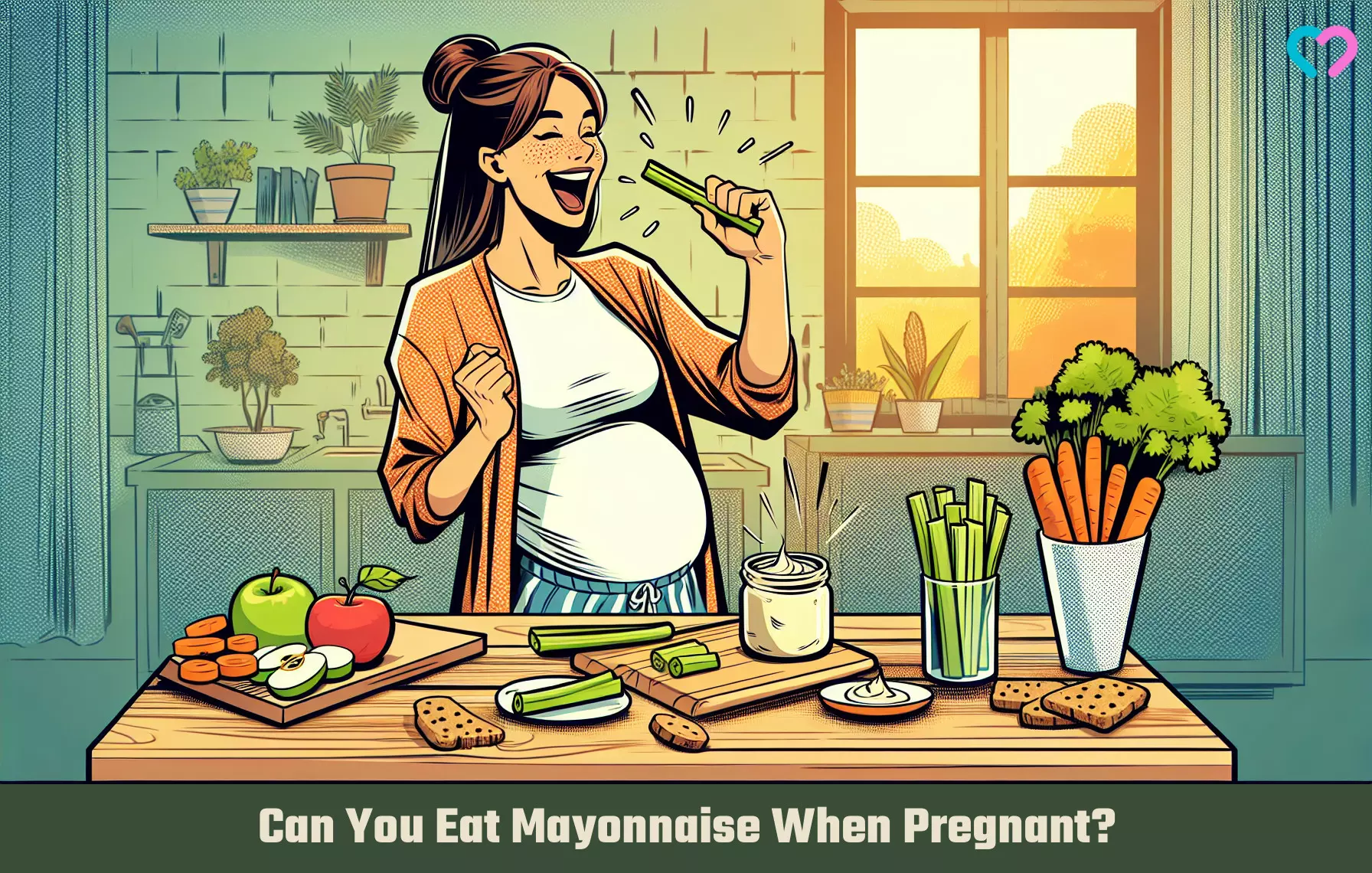
Image: Dall·E/MomJunction Design Team
Curious about consuming McDonald’s mayo during pregnancy? Watch this video to learn if it’s safe for expectant mothers to satisfy their mayo cravings.
References
1. Carla Di Mattia et al., (2015); Physical and structural properties of extra-virgin olive oil based mayonnaise
2. Mina Mirzanajafi-Zanjani et al.; Challenges and approaches for production of a healthy and functional mayonnaise sauce; National Center For Biotechnology Information (2018)
3. Foods to avoid in pregnancy; NHS
4. Is Hellman’s Mayo Safe During Pregnancy?; World Safety 2018
5. Dietary Guidelines For Americans; USDA
6. Micronutrient Needs During Pregnancy and Lactation; Oregon State University
7. Vitamins A, E, and K; National Center For Biotechnology Information
8. Berthold Koletzko et al.; Dietary fat intakes for pregnant and lactating women; ESPEN
9. About Listeria Infection; Centers For Disease Control And Prevention
10. Eating Right Before and During Pregnancy; University of California San Francisco
11. Derrick M. Chu et al.; Impact of maternal nutrition in pregnancy and lactation on offspring gut microbial composition and function; National Center For Biotechnology Information (2016)
12. Salad dressings; Diabetes, UK
13. “Just Mayo” Just Isnt Warns FDA; FAS
14.The Mayonnaise & Margarine Report; University at Buffalo
15.Listeria and Pregnancy; American College of Obstetricians and Gynecologists
Community Experiences
Join the conversation and become a part of our nurturing community! Share your stories, experiences, and insights to connect with fellow parents.
Read full bio of Dr. Shikha Sharma
- Sarah Bullard is a registered dietitian and writer. She has over 14 years of experience in research and clinical nutrition, personalized nutrition counseling, and nutrition education. Sarah has a bachelor’s degree in nutrition and a master’s degree in nutrition from Oklahoma State University.
 Sarah Bullard is a registered dietitian and writer. She has over 14 years of experience in research and clinical nutrition, personalized nutrition counseling, and nutrition education. Sarah has a bachelor’s degree in nutrition and a master’s degree in nutrition from Oklahoma State University.
Sarah Bullard is a registered dietitian and writer. She has over 14 years of experience in research and clinical nutrition, personalized nutrition counseling, and nutrition education. Sarah has a bachelor’s degree in nutrition and a master’s degree in nutrition from Oklahoma State University.
Read full bio of Swati Patwal
Read full bio of Rebecca Malachi
Read full bio of Reshmi Das







